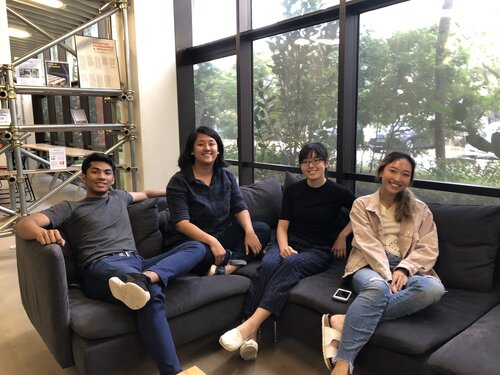The Jane Sun and John Wu Sunshine Award paved the way for NUS alumna's major breakthrough.

Ms Fatim Mohrini (2nd from left) with her team of innovators.
Meeting the right people in the right place at the right time — this usually comes as a result of opportunities that may not have been available, if not for the generous gifts of donors. Just ask Ms Fatim Mohrini, who was blessed with the formula for success.
Sometimes, all we need is a little nudge in the right direction.
For Ms Fatim Mohrini (’20), it began with an education grant to Shenzhen which paved the way to her major personal breakthrough — co-creating the world’s first 7-in-1 USB C Hub with a solid-state drive enclosure.
The NUS alumna’s Shenzhen internship stint was made possible by the Jane Sun and John Wu Sunshine Award. The fund supports students participating in the NUS Overseas Colleges (NOC) programme in China, an internship programme with a strong emphasis on technology entrepreneurship.
When asked about the impact the award has had on her life, Ms Fatim shared, “I have two brothers who were pursuing tertiary education at the same time that I was. They, too, aspired to go after overseas opportunities.
In the grand scheme of things, there was only so much each child could receive in financial support.”
“With the award, my parents did not have to take on as many shifts at work, and my brothers and I could embark on overseas endeavours,” added Ms Fatim.
It took a leap of faith for Ms Fatim to venture to China for the NOC Shenzhen programme. She was to spend six months away from her family in a foreign country, where language and cultural barriers can be daunting for some students.
Eventually, excitement and anticipation replaced any doubts that Ms Fatim had. After all, Shenzhen is known as the start-up city of China, and the place to be for aspiring technopreneurs like herself.
“I had the desire to move out of my comfort zone in Singapore and challenge myself to adapt to a new environment and learn how to manage on my own,” she said.
Her parents were thrilled for her. Their advice? Maximise every opportunity and learn from every experience.
And this was exactly what Ms Fatim did — working hard and playing hard.

Featuring the pocket-friendly Flujo Signature Pro.
During her time in Shenzhen, Ms Fatim made it a point to travel and explore the world’s most populous nation. She became acquainted with the cashless society and Didi, China’s version of Grab. She also rubbed shoulders with Singaporeans in Shenzhen, quickly becoming friends with fellow NUS students on the same NOC programme — Ms Helen Tan, Ms Karyn Chen and Mr Aaron Ramzeen.
What happened next was serendipity — meeting representatives from Matricx Singapore Pte Ltd, a computer peripherals manufacturer based in Shenzhen, and learning about their in-house brand, Flujo. That was where everything started for Ms Fatim.
“We got acquainted with the founder of the Flujo brand through a Singaporean-Malaysian-Indonesian group on WeChat. We met up for a meal, as we were curious about fellow Singaporeans working in Shenzhen,” Ms Fatim recalled.
“We were given the opportunity to visit Flujo’s office and factory. It was a rare opportunity to visit a factory in the part of China that produces almost all of the world’s electronics,” she explained.
The Flujo brand founder dreamed of creating a Singaporean brand for electronics, while the four NUS students wanted to leave their mark in the Silicon Valley of hardware. The visions of both parties were aligned. And so, work began.
“Since we were in Shenzhen, we thought it would bemeaningful to work on something that the city is well-known for — hardware. As mobile electronics are Flujo’s specialty, we decided that that’s where we would start,” Ms Fatim said, sharing the quartet’s ambitions.
After brainstorming with Flujo’s engineers, they identified a gap between USB-C multi adapters and SSD enclosures.
There were multiple rounds of refinements that involved testing and fixing botched prototypes, then taking their design to the drawing board to start all over again.
But they persevered and six months later, the Flujo Signature Pro was born.
The enterprising quartet launched a crowdfunding campaign on Kickstarter in October 2019, attracting more funding than initially expected.
Since then, the handy hub has been shipped to more than 249 backers from all over the world.
Having benefited greatly as a recipient of the Jane Sun and John Wu Sunshine Award, Ms Fatim is now living her technopreneurial dream as a business development executive at Matricx Singapore, the organisation that fuelled her foray into technopreneurship. She encourages fellow Malay students to consider the road less travelled.
She remarked, “A possible roadblock hindering my community to step out of their comfort zone is financial woes. I want to let them know that there are avenues that will enable them to reach for their ambitions.”






